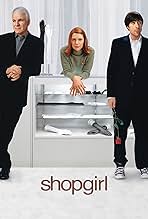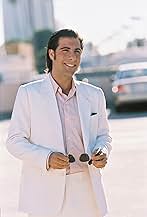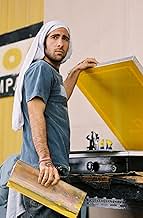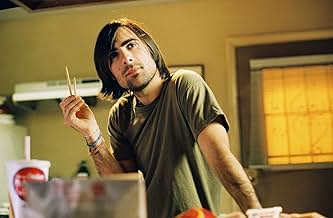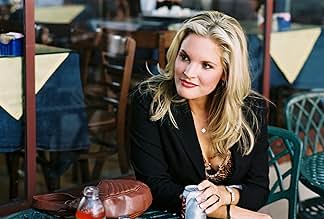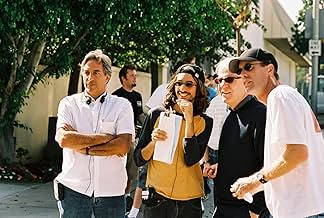CALIFICACIÓN DE IMDb
6.3/10
25 k
TU CALIFICACIÓN
Muestra un complejo triángulo amoroso entre una vendedora aburrida, un rico hombre de negocios y un joven sin rumbo.Muestra un complejo triángulo amoroso entre una vendedora aburrida, un rico hombre de negocios y un joven sin rumbo.Muestra un complejo triángulo amoroso entre una vendedora aburrida, un rico hombre de negocios y un joven sin rumbo.
- Premios
- 1 premio ganado y 7 nominaciones en total
John Fedevich
- Hot Tears Band Member
- (as Johnny Fedevich)
Opiniones destacadas
One of the best of this year that I have seen. Writing was top notch, acting great, and set direction and cinematography outstanding! Many of the shots were jaw droppingly "wow." A really pretty movie to look at and an emotionally torturing movie to watch for someone closer to Martin's age than the rest of the cast.
Sure, Ray is playing out a fantasy that is kind of creepy, but there are women looking for that kind of relationship, just listen to Dr. Laura. And men too, of course. Plus, the voice over sets this up as it basically says she is looking for love to "find her" and Ray does, so this is built into the premise like it or not. Over the course of the movie she matures beyond her fantasy, and I would like to think Ray does as well, although that isn't as clear.
Sure, Ray is playing out a fantasy that is kind of creepy, but there are women looking for that kind of relationship, just listen to Dr. Laura. And men too, of course. Plus, the voice over sets this up as it basically says she is looking for love to "find her" and Ray does, so this is built into the premise like it or not. Over the course of the movie she matures beyond her fantasy, and I would like to think Ray does as well, although that isn't as clear.
After some of the lesser films Steve Martin has been in lately, namely Cheaper by the Dozen, Bringing Down the House, and the like, it's a welcome sight to see him doing serious work. Shopgirl, adapted by Martin from his novella, is arguably his most serious work, and easily his most dramatic performance. However, in the world of Oscar prospects especially, the film will likely receive few accolades. Despite strong efforts from the cast, the film crashed between depressing drama and farcical comedy with none of the grace required.
The main issue with the film is Anand Tucker's direction. Only his second feature film, following 1998's Hilary and Jackie, Shopgirl is played far too serious. A heavy camera seems to plod its way through scene after scene. Several moments, mostly those with Jason Schwartzman in them, try to lighten things; but even some fairly good laughs cannot remove the feeling that this isn't a very happy film.
It is perhaps unfair to blame Tucker for the mood entirely. Similar complaints were leveled against Martin's original novella. But how much more endearing, how much more fun, this film would've been under someone like Rob Reiner. It is, after all, a comedy of relationship errors. There is drama here but the heart and soul of the story is in the laughter. The mistake is entirely in playing it as a drama with comedy, not a dramatic comedy.
The other main flaw is the tedious, and essentially needless, voice-over narration. Whether in screenplay format the narration read fine, or if it was added later to clarify the film for mainstream audiences, it detract. The actors are all capable enough to express their emotions without explanation. It is not hard to tell when a young woman goes home to an empty apartment and a cat that she is lonely. As remarked by a man sitting behind me: "A movie loses something when it has to be explained." The problem with the narration here is that Shopgirl doesn't need to be explained, but is.
Not helping the dreary atmosphere is Barrington Pheloung's ridiculously over-dramatic score. Echoing the work of Alexandre Desplat, especially Girl With a Pearl Earring (produced by Tucker), Pheloung seems insistent upon forcing drama into every note. The music plays less as an underscore than as an upstaging diva. Other technical work reaches must loftier heights. Nancy Steiner's endearing costume design, a cross between her work on The Virgin Suicides and a Day/Hudson comedy, gives instant heart to the characters. Danes' Mirabelle benefits the most. Likewise the art direction, by Sue Chan and David Smith, is delightful. Danes' apartment has an apt Vermont-meets-L.A. feel whereas Martin's two homes are cold and hollow, like his character.
The curious thing is that when all the elements come together Shopgirl is an enjoyable experience. As it was playing I really liked it. But when all is said and done there is something missing. Once you stop laughing you realize it is a profoundly unhappy film. Despite the strong and endearing performances the film is simply too sad to win any hearts, but well-meaning enough not to send any away.
The main issue with the film is Anand Tucker's direction. Only his second feature film, following 1998's Hilary and Jackie, Shopgirl is played far too serious. A heavy camera seems to plod its way through scene after scene. Several moments, mostly those with Jason Schwartzman in them, try to lighten things; but even some fairly good laughs cannot remove the feeling that this isn't a very happy film.
It is perhaps unfair to blame Tucker for the mood entirely. Similar complaints were leveled against Martin's original novella. But how much more endearing, how much more fun, this film would've been under someone like Rob Reiner. It is, after all, a comedy of relationship errors. There is drama here but the heart and soul of the story is in the laughter. The mistake is entirely in playing it as a drama with comedy, not a dramatic comedy.
The other main flaw is the tedious, and essentially needless, voice-over narration. Whether in screenplay format the narration read fine, or if it was added later to clarify the film for mainstream audiences, it detract. The actors are all capable enough to express their emotions without explanation. It is not hard to tell when a young woman goes home to an empty apartment and a cat that she is lonely. As remarked by a man sitting behind me: "A movie loses something when it has to be explained." The problem with the narration here is that Shopgirl doesn't need to be explained, but is.
Not helping the dreary atmosphere is Barrington Pheloung's ridiculously over-dramatic score. Echoing the work of Alexandre Desplat, especially Girl With a Pearl Earring (produced by Tucker), Pheloung seems insistent upon forcing drama into every note. The music plays less as an underscore than as an upstaging diva. Other technical work reaches must loftier heights. Nancy Steiner's endearing costume design, a cross between her work on The Virgin Suicides and a Day/Hudson comedy, gives instant heart to the characters. Danes' Mirabelle benefits the most. Likewise the art direction, by Sue Chan and David Smith, is delightful. Danes' apartment has an apt Vermont-meets-L.A. feel whereas Martin's two homes are cold and hollow, like his character.
The curious thing is that when all the elements come together Shopgirl is an enjoyable experience. As it was playing I really liked it. But when all is said and done there is something missing. Once you stop laughing you realize it is a profoundly unhappy film. Despite the strong and endearing performances the film is simply too sad to win any hearts, but well-meaning enough not to send any away.
It's no real secret that through his writing, Steve Martin has depth and sentimentality that Hollywood doesn't always let him show. He has shown signs of a longing to grow old gracefully (as his almost gimmick-free gigs as Oscar host have shown) and let his acerbic wit and insight drive projects more than the over-the-top slapstick antics of the 1970s Steve Martin.
It's also no real secret that many of his recent films have been far from great.
So, still having faith in the man, and having loved the novel on which this film is based, I went in to the cinema desperately wanting to like it, but expecting to be disappointed. Largely, I was pleasantly surprised that the novel did transfer well to the screen.
Some of the credit for this belongs to director Anand Tucker, who has created some powerful images of the hustle and bustle of the LA that Martin describes in the novel, and contrasts it well with the characters who lead shallow lives, trying to be something meaningful amongst all the chaos.
Credit also goes to the actors who show that longing that drives the situation: Claire Daines as Mirabelle clearly WANTS to be social, artistic, loved; Jason Schwartzman as Jeremy WANTS to be sensitive, witty, lovable; Martin as Ray Porter clearly WANTS to be suave and considerate. Without having many jokes in the script, audiences can still appreciate the humour by seeing these pathetic struggles. When I saw it there was plenty of laughter at all the right moments.
I will, however, hasten to add that there are parts of the book that never would have translated well to the Hollywood screen, and the praise that some give the movie for serving its purpose will contain the same reasons that others wish to knock it. The book's strength is that one can feel for the characters because they are portrayed as superficial people and their lives and conversations are so shallow in comparison to the narrative that sets them up. The reasons why it works so well as a book could well be the very things that cause it to not work on the screen. Then there's the matter of a book that's so rooted in "LA sux" sentiment being made into a Hollywood movie. So maybe the musical overkill reeked of "excuse me, we're trying to tell you something". Maybe the spots of narration felt out of place and indicated that Martin is not yet over his desire to spend his life as the 'star' of his projects (him getting top billing for the movie was also a bit much, in my opinion).
Ultimately, maybe the audience members who were longing for a film with more 'depth' and 'substance' were in actuality sharing the characters' longings for the same in their own lives. Maybe the 'criticisms' are in fact backhanded compliments that the film is largely doing just what it's meant to do.
It's also no real secret that many of his recent films have been far from great.
So, still having faith in the man, and having loved the novel on which this film is based, I went in to the cinema desperately wanting to like it, but expecting to be disappointed. Largely, I was pleasantly surprised that the novel did transfer well to the screen.
Some of the credit for this belongs to director Anand Tucker, who has created some powerful images of the hustle and bustle of the LA that Martin describes in the novel, and contrasts it well with the characters who lead shallow lives, trying to be something meaningful amongst all the chaos.
Credit also goes to the actors who show that longing that drives the situation: Claire Daines as Mirabelle clearly WANTS to be social, artistic, loved; Jason Schwartzman as Jeremy WANTS to be sensitive, witty, lovable; Martin as Ray Porter clearly WANTS to be suave and considerate. Without having many jokes in the script, audiences can still appreciate the humour by seeing these pathetic struggles. When I saw it there was plenty of laughter at all the right moments.
I will, however, hasten to add that there are parts of the book that never would have translated well to the Hollywood screen, and the praise that some give the movie for serving its purpose will contain the same reasons that others wish to knock it. The book's strength is that one can feel for the characters because they are portrayed as superficial people and their lives and conversations are so shallow in comparison to the narrative that sets them up. The reasons why it works so well as a book could well be the very things that cause it to not work on the screen. Then there's the matter of a book that's so rooted in "LA sux" sentiment being made into a Hollywood movie. So maybe the musical overkill reeked of "excuse me, we're trying to tell you something". Maybe the spots of narration felt out of place and indicated that Martin is not yet over his desire to spend his life as the 'star' of his projects (him getting top billing for the movie was also a bit much, in my opinion).
Ultimately, maybe the audience members who were longing for a film with more 'depth' and 'substance' were in actuality sharing the characters' longings for the same in their own lives. Maybe the 'criticisms' are in fact backhanded compliments that the film is largely doing just what it's meant to do.
"Shopgirl" is an off-kilter modern romance. It plays on several conventions of movies, from the old-fashioned "The Shop Around the Corner" to the fairy tale "Pretty Woman," but takes surprising turns away from those stereotypes.
The look and sound of the film are half of its appeal, from Peter Suschitzky's dreamy cinematography, to the production and art design that has each character in their own color scheme, to the enthralling score by Barrington Pheloung, though the atmospherics almost overwhelm the three characters who frequently seem like pieces in a set design as the camera slowly glides back to reveal an entire mise en scene.
Claire Danes is radiant and holds our eye and sympathy throughout the film, as we see life mostly from her first naive than wiser perspective, though she is portrayed as just about the last sweet young woman in the country, as all the other women seem pretty cold-blooded. While she has an underlying problem common to such in TV and movies these days, it is handled surprisingly visually and tenderly.
Over fourteen months, she encounters a bumbling young suitor, the adorably scruffy Jason Schwartzman, who even as his character matures retains endearing enthusiasm and quirks, and a sugar daddy in a somewhat mysterious Steve Martin, who is more believable than "Sex and the City"s similar "Mr Big." Ironically, the few physical comedy scenes are with Schwartzman, not Martin-- and that's a very funny scene about a condom, as this film in its quiet way is pretty frank about sex.
An occasional voice-over narration is obtrusive and unnecessary, even as Martin's adaptation of his novella claims the need for an omniscient observer, but the camera and the characters' body language visually communicate the same information. The sudden insertion of a parallel scene where two main characters suddenly explain themselves to listeners who we didn't know previously existed in their lives is a bit too convenient and doesn't really fit.
But the film is on the whole winning, as each character very gradually learns about who they are and who they can be, about the meaning of life, love, success and human connections, and about the clear-eyed choices they can make to attain these, to change or not. While the bulk of the film is set in Los Angeles, it feels like a picaresque journey of discovery as they go from one scene to another.
The song selections are marvelous, particularly Mark Kozelek's varied twists on different genres to reflect the different characters. It's a cute joke to have Schwartzman's "Jeremy" as a roadie when he has been on the road with Phantom Planet.
The costume design by Nancy Steiner is lovely; clearly the shopgirl was using all the discounts available to her at Saks even before a paternalistic benefactor picks up the tab.
The look and sound of the film are half of its appeal, from Peter Suschitzky's dreamy cinematography, to the production and art design that has each character in their own color scheme, to the enthralling score by Barrington Pheloung, though the atmospherics almost overwhelm the three characters who frequently seem like pieces in a set design as the camera slowly glides back to reveal an entire mise en scene.
Claire Danes is radiant and holds our eye and sympathy throughout the film, as we see life mostly from her first naive than wiser perspective, though she is portrayed as just about the last sweet young woman in the country, as all the other women seem pretty cold-blooded. While she has an underlying problem common to such in TV and movies these days, it is handled surprisingly visually and tenderly.
Over fourteen months, she encounters a bumbling young suitor, the adorably scruffy Jason Schwartzman, who even as his character matures retains endearing enthusiasm and quirks, and a sugar daddy in a somewhat mysterious Steve Martin, who is more believable than "Sex and the City"s similar "Mr Big." Ironically, the few physical comedy scenes are with Schwartzman, not Martin-- and that's a very funny scene about a condom, as this film in its quiet way is pretty frank about sex.
An occasional voice-over narration is obtrusive and unnecessary, even as Martin's adaptation of his novella claims the need for an omniscient observer, but the camera and the characters' body language visually communicate the same information. The sudden insertion of a parallel scene where two main characters suddenly explain themselves to listeners who we didn't know previously existed in their lives is a bit too convenient and doesn't really fit.
But the film is on the whole winning, as each character very gradually learns about who they are and who they can be, about the meaning of life, love, success and human connections, and about the clear-eyed choices they can make to attain these, to change or not. While the bulk of the film is set in Los Angeles, it feels like a picaresque journey of discovery as they go from one scene to another.
The song selections are marvelous, particularly Mark Kozelek's varied twists on different genres to reflect the different characters. It's a cute joke to have Schwartzman's "Jeremy" as a roadie when he has been on the road with Phantom Planet.
The costume design by Nancy Steiner is lovely; clearly the shopgirl was using all the discounts available to her at Saks even before a paternalistic benefactor picks up the tab.
Greetings again from the darkness. Gotta hand it to 60 year old Steve Martin. He cranks out the easy hits like "Father of the Bride" and "Cheaper by the Dozen" so that he can do his own pet projects like the underrated "Bowfinger" and now "Shopgirl". Based on his own novella, Martin explores the mid-life fantasy of a powerful, rich businessman who takes on a beautiful, younger, unspoiled country girl from Vermont.
While the insight into quiet desperation is always fascinating, Martin's script fails to really show any human connection between the three leads. Martin's own character, while easily the most privileged, is far and away the most distant and least interesting. The always interesting Claire Danes desperately wants to be loved and escape the ever-present cold existence of Vermont which continues to haunt her. Jason Schwartzman (fast cornering the market on quirky to the point of annoying dudes) is initially enamored with the idea of being with Claire (or anyone) but goes on the road with a rock band and finds himself ... or at least educates himself on how to fit into society.
Not sure if any of the characters have any real redeeming qualities, but they do make for moderately interesting film-making. Bridgette Wilson (Mrs. Pete Sampras) has a fluffy role as the envious make-up queen, Sam Bottoms makes a rare screen appearance as Danes say-little Dad and Francis Conroy (Beautiful Flowers, Six Feet Under) has a brief appearance as Daines Mom. Interesting side note is that Rebecca Pigeon has a small role ... she is the real life wife of the great David Mamet.
Although, the lighting is atrocious and distracting in most every scene, you do find yourself hoping that someone, ANYONE, discovers a moment of real happiness. Yes, this story could have been better presented, but it is worth watching to view first hand how people pretend to connect.
While the insight into quiet desperation is always fascinating, Martin's script fails to really show any human connection between the three leads. Martin's own character, while easily the most privileged, is far and away the most distant and least interesting. The always interesting Claire Danes desperately wants to be loved and escape the ever-present cold existence of Vermont which continues to haunt her. Jason Schwartzman (fast cornering the market on quirky to the point of annoying dudes) is initially enamored with the idea of being with Claire (or anyone) but goes on the road with a rock band and finds himself ... or at least educates himself on how to fit into society.
Not sure if any of the characters have any real redeeming qualities, but they do make for moderately interesting film-making. Bridgette Wilson (Mrs. Pete Sampras) has a fluffy role as the envious make-up queen, Sam Bottoms makes a rare screen appearance as Danes say-little Dad and Francis Conroy (Beautiful Flowers, Six Feet Under) has a brief appearance as Daines Mom. Interesting side note is that Rebecca Pigeon has a small role ... she is the real life wife of the great David Mamet.
Although, the lighting is atrocious and distracting in most every scene, you do find yourself hoping that someone, ANYONE, discovers a moment of real happiness. Yes, this story could have been better presented, but it is worth watching to view first hand how people pretend to connect.
¿Sabías que…?
- TriviaFor the scene in Mirabelle's bedroom where the cat jumps on the bed and watches her and Jeremy, there were actually two cats used. The director explains in his commentary that one could jump but never watched, and the other was good at watching but couldn't jump.
- ErroresThe card that Ray sends to Mirabelle reads "I would like to have dinner with you" in block print, with a signature at the bottom. When we see this card again at the very end of the movie, the signature has been replaced by "Ray Porter" in block print.
- Citas
Ray Porter: As Ray Porter watches Mirabelle walk away he feels a loss. How is it possible, he thinks, to miss a woman whom he kept at a distance so that when she was gone he would not miss her. Only then does he realize that wanting part of her and not all of her had hurt them both and how he cannot justify his actions except that... well... it was life.
- ConexionesFeatured in Late Show with David Letterman: Episode #13.53 (2005)
- Bandas sonorasLily & Parrots
Written and Performed by Mark Kozelek
Published by God Forbid (BMI)
Courtesy of Jetset Records
Selecciones populares
Inicia sesión para calificar y agrega a la lista de videos para obtener recomendaciones personalizadas
- How long is Shopgirl?Con tecnología de Alexa
- why does Steve Martin narrate and also play a character? are these supposed to come across as related? it seems separate to me, since the narrative is in third person.
Detalles
- Fecha de lanzamiento
- País de origen
- Idiomas
- También se conoce como
- Shopgirl
- Locaciones de filmación
- 2250 Apollo Dr., Los Ángeles, California, Estados Unidos(Ray Porter's home.)
- Productoras
- Ver más créditos de la compañía en IMDbPro
Taquilla
- Presupuesto
- USD 10,200,000 (estimado)
- Total en EE. UU. y Canadá
- USD 10,284,523
- Fin de semana de estreno en EE. UU. y Canadá
- USD 229,685
- 23 oct 2005
- Total a nivel mundial
- USD 11,675,161
- Tiempo de ejecución1 hora 46 minutos
- Color
- Mezcla de sonido
- Relación de aspecto
- 2.35 : 1
Contribuir a esta página
Sugiere una edición o agrega el contenido que falta

Principales brechas de datos
By what name was Chica De Mostrador (2005) officially released in India in English?
Responda






